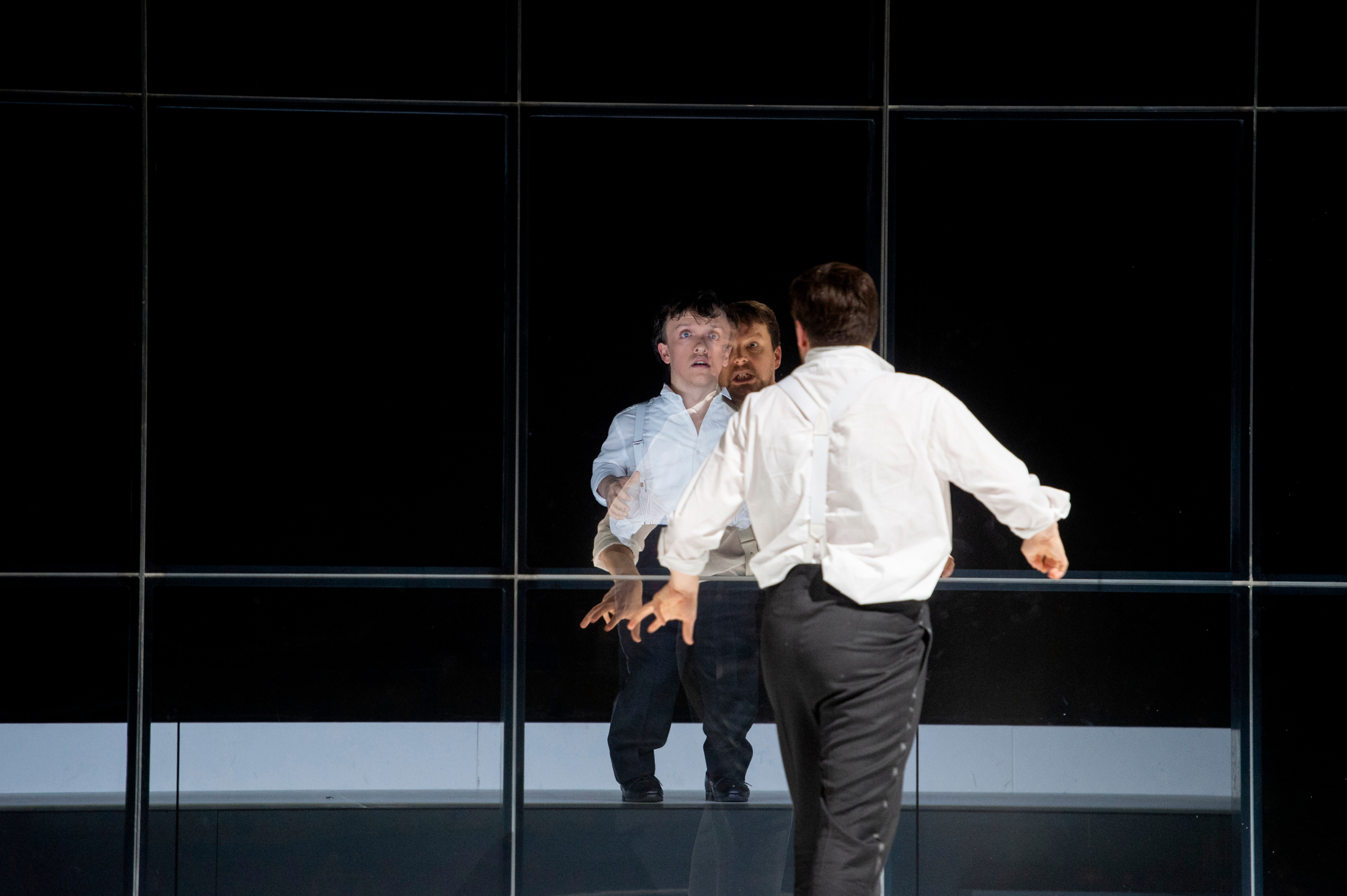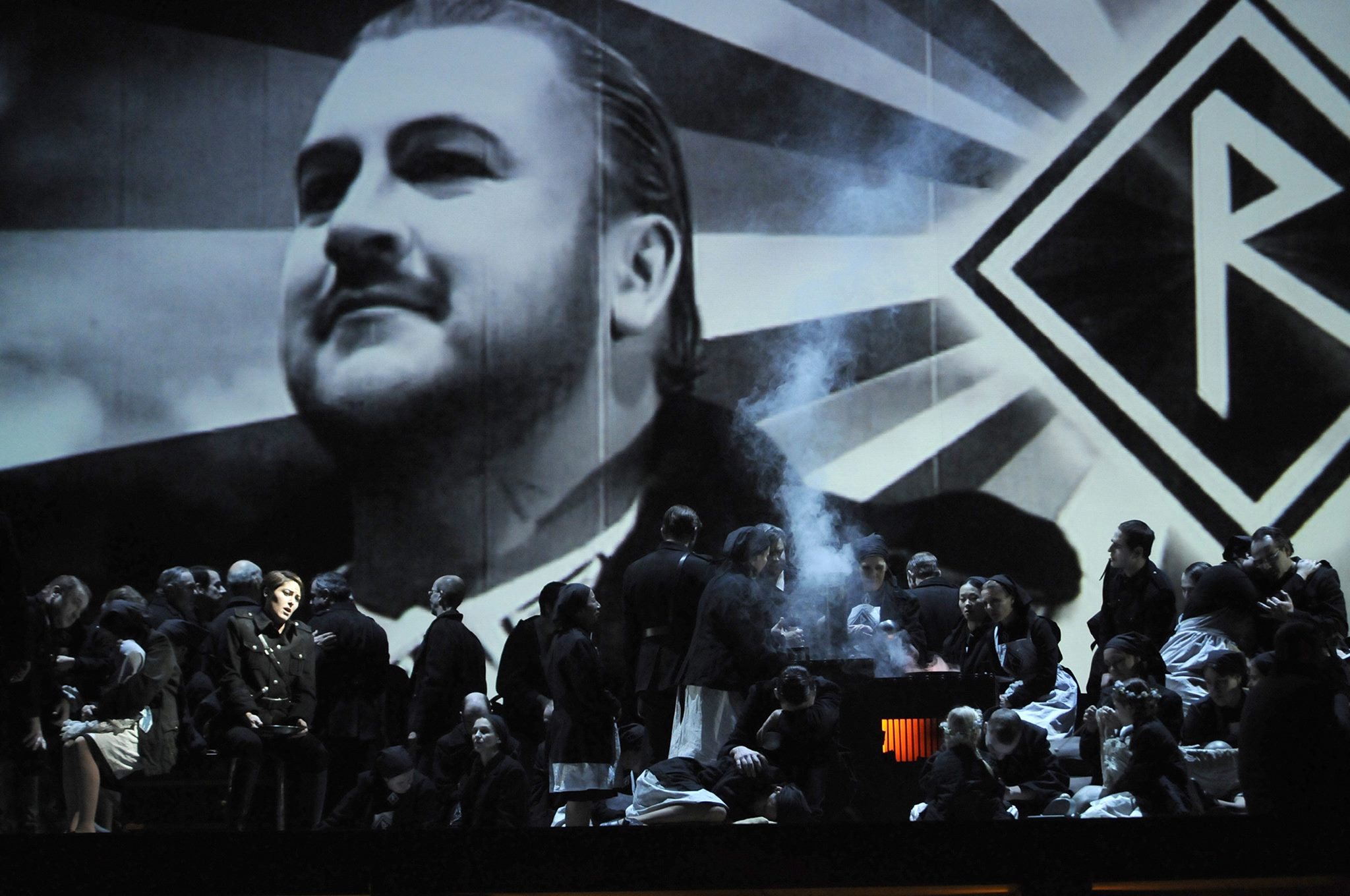Reviews
Deutsche Oper Offers 2 Rarities: Der Zwerg and Rienzi
BERLIN — Deutsche Oper presented a pair of rarely seen operas in rotation recently: Alexander Zemlinsky’s unfairly neglected Der Zwerg (“The Dwarf”) and Richard Wagner’s grandiose early breakthrough, Rienzi — a work understandably overshadowed by what came after it.
Zemlinsky tends to show up as little more than a footnote in discussions of Schoenberg (his student) and Mahler (his rival for Alma Schindler’s affections), both of whose work he championed. But this compelling production of his one-act opera (which premiered in 1922) leaves no doubt that Zemlinsky is long overdue for a proper and sustained revival.
Adapted from Oscar Wilde’s short story The Birthday of the Infanta, Der Zwerg dramatizes the breakdown of its protagonist, an unnamed Dwarf and gifted musician presented to Princess Clara as a birthday gift. The dwarf performs his duty singing for Clara and falls in love with her, unable to sense why he is mocked. Only when he encounters his reflection for the first time does the Dwarf suddenly understand that he is perceived as a deformed Outsider. The revelation destroys him.
Zemlinsky’s brief relationship with Alma (another of his students, who abruptly rejected him in favor of Gustav Mahler) had ended nearly two decades before he began Der Zwerg, but the psychological reverberations remained as devastatingly intense — according to director Tobias Kratzer’s new production. He underscores the autobiographical aspect by adding a prologue: Schoenberg’s Accompaniment to a Film Scene (1930), a brief orchestral work for an imaginary film, here staged as a lesson between Zemlinsky and Alma in which flirtation is followed by contemptuous rejection.
Schoenberg’s score teems with expressive details that are effectively enhanced by this concentrated scenario. Kratzer shifts from its silent-film sensibility to a play-within-the-play concept for Der Zwerg: The Princess’s festivities take place in a sleekly minimalist, white concert hall (set and costumes by Rainer Sellmaier). His main dramaturgical idea is to represent the split consciousness at the heart of the opera— how the Dwarf perceives himself versus how he is perceived — by double casting the character as an actor (Mick Morris Mehnert) and a singer (David Butt Philip) who perform simultaneously.
 Mick Morris Mehnert and David Butt Philip in Der Zwerg
Mick Morris Mehnert and David Butt Philip in Der Zwerg
It turns out to be a moving way of articulating the fundamental tension Zemlinsky exploits by composing seductively beautiful music to accompany such a cruel story. On opening night (March 24), Donald Runnicles coaxed the score’s sumptuous, swelling melodies to fully blossom while at the same time keeping the dramatic tension taut, with everything gravitating towards Der Zwerg’s shattering emotional climax. The moment of painful insight — intensified by Stefan Woinke’s excellent lighting — had the immediacy of a verismo denouement.
Zemlinsky’s punishingly difficult writing for the lead tenor role—the high tessitura underscores the impression of the Dwarf straining beyond tragic limitations—is reminiscent at times of the Bacchus role in Ariadne auf Naxos. Butt Philips delivered a passionate, heroic performance and was well matched by Elena Tsallagova’s ravishingly sung Clara, who suggested a Salome-like curiosity about the newcomer before pulling back. As her maid Ghita, Emily Magee infused rare moments of humanity in contrast to the partygoers, characterized by Zemlinsky’s lush choral writing. Bass Philipp Jekal depicted Ghita’s counterpart, Don Estoban, as a stern majordomo. Kratzer frames the opera with another image of Zemlinsky: his marble bust is ritually positioned alongside those of other Immortals (much as they appear in Berlin’s main Konzerthaus hall, with Beethoven & Co. peering down) — his art the payoff for so much suffering.
Schoenberg pithily described the scenario for Accompaniment to a Film Scene as unfolding in three phases: “impending danger, fear, and catastrophe.” Wagner’s Rienzi: The Last of the Tribunes, which he adapted from Edward Bulwer-Lytton’s 1835 novel and completed in 1840, traces a classical rise-and-fall trajectory. But in Philipp Stölzl’s production (which originated at Deutsche Oper in 2010), the opera hews more closely to Schoenberg’s 20th-century sensibility of unfolding disaster. Similarly staged with a prefatory cinematic idea — in this case, an actual silent film in the style of Leni Riefenstahl’s WWII propaganda films, shown during the overture — Wagner’s reflection on a failed populist revolution in Rome of the late Middle Ages is here transformed into the grim and all-too-familiar parable of a fascist dictator.
Familiarity with what Wagner accomplished post-Renzi inevitably tinges any experience of this work. Being aware of the heights to come not only highlights Rienzi’s weaknesses — vast stretches of mediocre padding, underdeveloped characterizations, sequential repetitions — but endows it with a strange aura: as if this were a minor composer’s unconvincing attempt to imitate Wagner. The whole is distinctly less than the sum of its parts. Even though Rienzi marked Wagner’s first triumph with the public, it’s not surprising that he regarded it as unworthy of his Bayreuth legacy.
 Scene from Deutsche Opera's Rienzi
Scene from Deutsche Opera's Rienzi
And yet: This streamlined version of the gigantic score (cut down to a total of three hours, including an intermission) was often gripping on its own terms. Tenor Torsten Kerl reprised the title role for this revival of the 2010 production. On opening night (April 5), it was announced that Kerl was fighting an infection, but despite some unevenness in his singing, he projected a powerful image of a self-infatuated autocrat. Stölzl’s direction called for lots of Mussolini-like preening and posing, making the character unsympathetic from the start — absurd, dangerous, but not tragic — yet weirdly fascinating.
As his daughter Irene, Martina Welschenbach failed to make much of an impression until the final act, set, of course, in an air raid bunker, where she insists on following Rienzi to the bitter, Götterdämmerung-presaging end. Singing the trouser role of Adriano, Annika Schlicht brought out the raging internal conflicts that bedevil the character, who is caught between his love for Irene and loyalty to his father, Steffano Colonna (an imposing Andrew Harris), who was killed during the patricians’ assault against Rienzi and the plebeians. Indeed, Adriano emerged as the most intriguing of the principals, though Wagner stints on developing the love story beyond the barest outlines.
With its prominent role in the drama, the chorus set the emotional temperature through much of the evening. Often the stage became so crowded that the focus on the individual dramas playing out was broken — though that seems to have been Stölzl’s intention, and Lorenzo Nencini’s fantastic lighting superimposed a sense of dramatic order over all the chaos. Conductor Evan Rogister paced events with verve.
Der Zwerg photo by Monika Ritterhaus
Rienzi photo by Bettina Stöß




 FEATURED JOBS
FEATURED JOBS

 RENT A PHOTO
RENT A PHOTO


